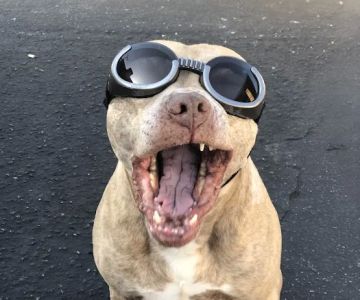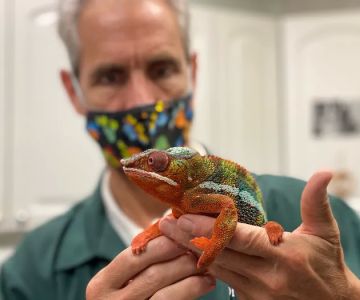Understanding Dog Allergies: What Every Pet Owner Needs to Know
As a pet owner, nothing is more heartbreaking than seeing your dog suffer from allergies. Just like humans, dogs can experience allergic reactions to a variety of substances, ranging from food ingredients to environmental triggers. As a dog lover, it’s crucial to understand how to identify and treat these allergies to ensure your furry friend lives a comfortable, healthy life.

1225 Warren Ave, Downers Grove, IL 60515, USA
See DetailsWhat Causes Dog Allergies?
Just as humans are allergic to pollen, dust mites, or certain foods, dogs can be allergic to similar environmental factors or even the food they eat. The most common allergens for dogs are:
- Food allergens: Certain proteins like beef, chicken, dairy, or grains can trigger allergic reactions in dogs. Food allergies may lead to skin irritations, digestive problems, or more severe reactions.
- Environmental allergens: Dust mites, pollen, mold, and even certain types of grasses can cause allergic reactions in dogs.
- Flea allergies: Some dogs develop allergic reactions to flea saliva, resulting in itching, hair loss, and skin infections.
- Household products: Chemicals found in cleaning products, fragrances, and even certain fabrics may be irritants.
Signs Your Dog Might Have Allergies
Knowing the symptoms of allergies in dogs is essential for early identification and treatment. Dogs can’t tell us when they’re feeling uncomfortable, so being vigilant is key. Here are some common signs that your dog may have allergies:
- Itchy, red skin: Dogs with allergies often scratch or bite at their skin, leading to redness, sores, or bald patches. If your dog is constantly scratching or licking certain areas, it could be an allergy symptom.
- Ear infections: Allergies can cause inflammation in a dog’s ears, leading to frequent ear infections. If your dog shakes their head or scratches their ears, it’s a good idea to have them checked for allergies.
- Digestive issues: Vomiting, diarrhea, or changes in appetite can indicate a food allergy. Watch for these signs if you suspect your dog has a sensitivity to certain foods.
- Respiratory problems: Sneezing, coughing, and watery eyes can be signs that your dog is reacting to airborne allergens like pollen or dust mites.
How to Diagnose Dog Allergies
If you notice any of the symptoms above, it's essential to visit a veterinarian who can help diagnose your dog's allergies. Your vet may perform several tests, including:
- Skin tests: These tests involve applying small amounts of allergens to your dog’s skin to see if a reaction occurs.
- Blood tests: Blood tests can detect specific antibodies that indicate an allergic reaction to certain allergens.
- Food elimination trials: If food allergies are suspected, your vet may suggest an elimination diet to identify which foods your dog is sensitive to.
Treating Dog Allergies: Solutions for a Healthier, Happier Pet
Once your dog’s allergies have been diagnosed, it's time to look at treatment options. The right treatment depends on the type of allergies your dog has. Below are some common methods for managing allergies in dogs:
1. Medication
For many dogs, medication is the most effective way to manage allergy symptoms. Antihistamines and corticosteroids are often prescribed to reduce inflammation, itching, and discomfort. Your vet may also suggest immune-modulating drugs if your dog’s allergies are severe.
2. Allergy Shots (Immunotherapy)
Allergy shots are another common treatment for dogs with environmental allergies. These shots gradually desensitize your dog to specific allergens over time, helping to reduce allergic reactions in the future.
3. Specialized Diets
If your dog has food allergies, the best solution is to switch to a hypoallergenic dog food. These diets are formulated with novel proteins and limited ingredients to avoid common allergens. You may also need to avoid giving your dog treats or table scraps that could trigger a reaction.
4. Flea Control
If your dog suffers from flea allergies, maintaining strict flea control is crucial. Use a veterinarian-approved flea prevention program to keep fleas at bay and ensure your dog remains comfortable.
5. Bathing and Skin Care
Regular baths with a gentle, hypoallergenic shampoo can help soothe itchy skin and remove allergens from your dog’s coat. Be sure to consult your vet about the best products for your dog’s specific needs.
Preventing Dog Allergies: Tips for Keeping Your Pet Comfortable
While it's not always possible to prevent allergies entirely, there are steps you can take to minimize your dog's exposure to allergens:
- Regular cleaning: Keep your home free of dust, mold, and other environmental allergens by vacuuming frequently and using air purifiers.
- Proper nutrition: Feed your dog a balanced, high-quality diet to help boost their immune system and avoid food allergies.
- Frequent baths: Regular baths with hypoallergenic shampoo can reduce the buildup of allergens on your dog’s skin and coat.
- Flea prevention: Always use flea prevention methods, especially if your dog is allergic to flea bites.
In conclusion, identifying and treating dog allergies may require some effort and patience, but with the right approach, your dog can lead a more comfortable, happy life. As pet owners, we want to do everything we can to ensure our dogs are free from pain and discomfort, and understanding allergies is an important step in that journey. Whether through medication, dietary changes, or environmental modifications, there are effective solutions available. Don’t hesitate to consult your vet for expert guidance and support to manage your dog’s allergies.











